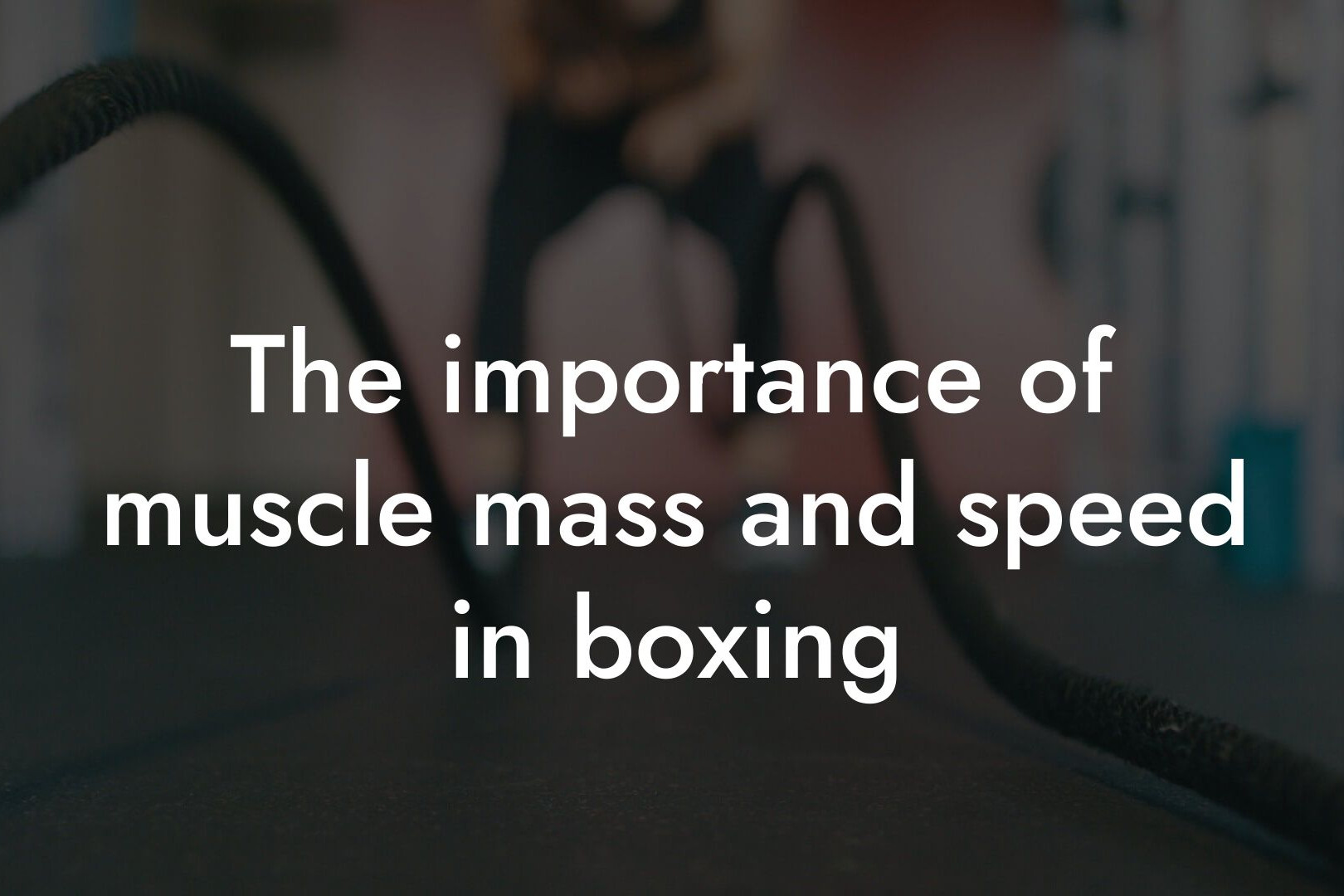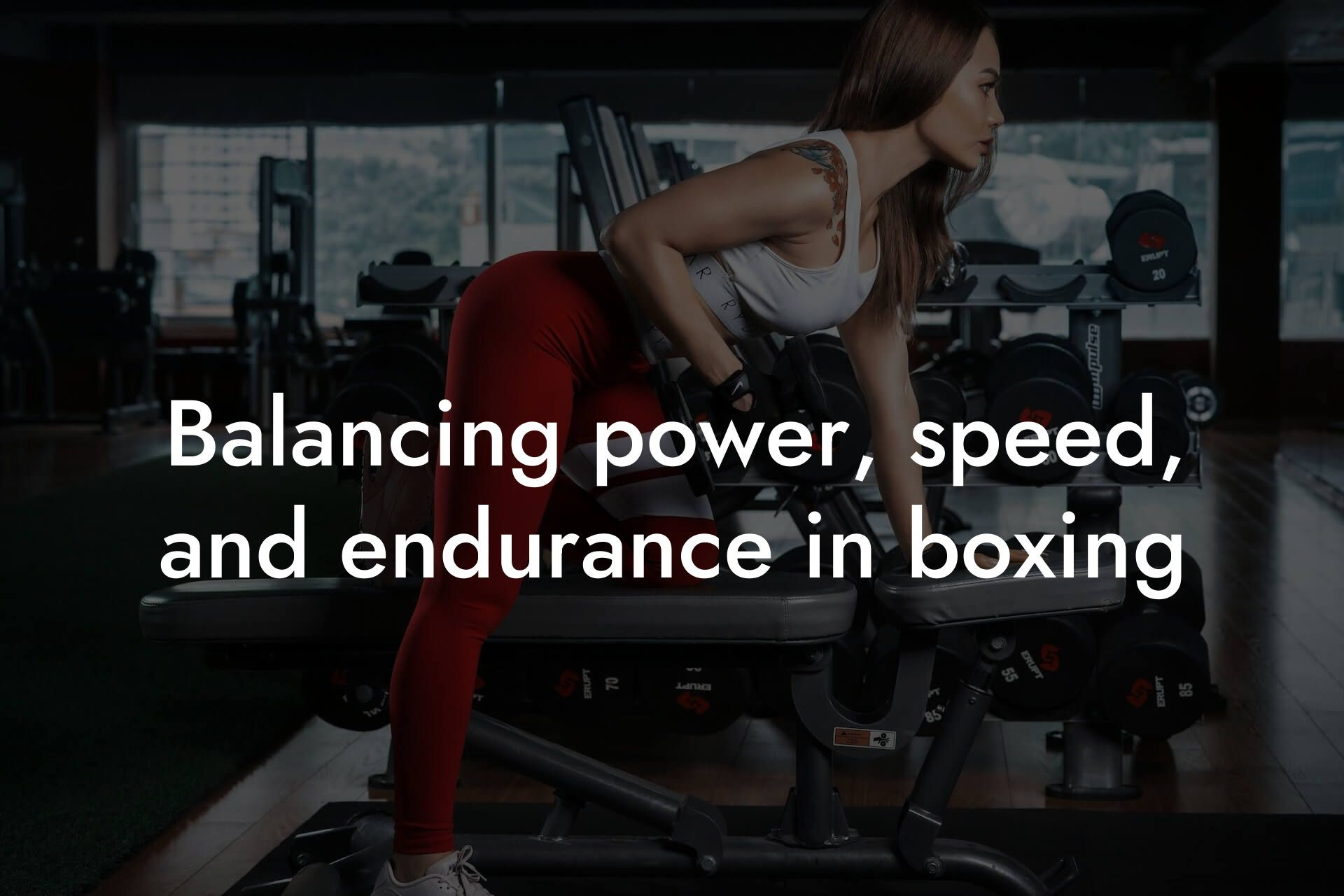As a boxer, you know that your diet plays a crucial role in your performance in the ring. A well-planned nutrition strategy can help you maintain energy levels, build and repair muscle, and optimize your overall physical performance. In this article, we'll provide you with expert nutrition tips to help you take your boxing to the next level.
Table of Contents
Macronutrient Balance
A balanced diet that provides the right amount of macronutrients is essential for optimal energy production and muscle function. As a boxer, you need a diet that is high in carbohydrates, moderate in protein, and low in fat. Aim to consume:
• 55-65% of your daily calories from complex carbohydrates such as whole grains, fruits, and vegetables
• 15-20% of your daily calories from lean protein sources such as chicken, fish, and eggs
• 20-25% of your daily calories from healthy fats such as nuts, seeds, and avocados
Hydration
Adequate hydration is critical for optimal physical performance. As a boxer, you need to drink plenty of water to stay hydrated, especially during intense training sessions. Aim to drink at least 8-10 glasses of water per day, and make sure to drink water during and after your workouts.
Electrolytes
Electrolytes such as sodium, potassium, and magnesium play a crucial role in regulating fluid balance and nerve function. As a boxer, you need to replenish electrolytes lost during intense training sessions. You can do this by consuming electrolyte-rich foods such as bananas, avocados, and nuts, or by taking an electrolyte supplement.
Post-Workout Nutrition
What you eat after a workout can have a significant impact on your recovery and muscle growth. As a boxer, you need to consume a meal or snack that provides a mix of carbohydrates and protein within 30-60 minutes after your workout. This can help promote muscle recovery, reduce muscle soreness, and support muscle growth.
Some examples of post-workout meals or snacks include:
• A protein shake with banana and almond milk
• A handful of nuts and dried fruits
• A meal of grilled chicken with sweet potato and steamed vegetables
Meal Frequency and Timing
As a boxer, you need to eat frequently to maintain energy levels and support muscle growth. Aim to eat 5-6 meals per day, spaced out every 2-3 hours. This can include 3 main meals, 2-3 snacks, and 1-2 post-workout meals or snacks.
Make sure to eat a balanced meal that includes a mix of carbohydrates, protein, and healthy fats 1-2 hours before your workout. This can help provide energy and support muscle function during your workout.
Supplements
While a well-planned diet is essential for optimal performance, supplements can provide an added boost. As a boxer, you may consider taking the following supplements:
• Protein powder to support muscle growth and recovery
• Creatine to increase energy production and endurance
• Branched-Chain Amino Acids (BCAAs) to reduce muscle soreness and support muscle growth
However, always consult with a healthcare professional or registered dietitian before taking any supplements to ensure they are safe and effective for you.
Foods to Avoid
As a boxer, you need to avoid foods that can hinder your performance and recovery. Some foods to avoid include:
• Processed meats such as hot dogs and sausages
• Fried foods such as french fries and fried chicken
• High-sugar foods such as candy and pastries
• Foods high in saturated and trans fats such as butter and margarine
Body Composition Analysis
As a boxer, you need to monitor your body composition to ensure you're at optimal levels for performance. A body composition analysis using a DEXA machine can provide you with valuable information on your body fat percentage, lean muscle mass, and bone density. This can help you tailor your nutrition and training program to achieve your goals.
At Tano Performance Group, we offer comprehensive body composition analysis using a DEXA machine. Our team of experts can help you interpret your results and provide personalized recommendations to take your boxing to the next level.
Frequently Asked Questions
What are the most important nutrients for boxers to focus on for energy and muscle maintenance?
As a boxer, it's crucial to prioritize carbohydrates, protein, and healthy fats in your diet. Carbohydrates provide energy for your workouts and competitions, while protein helps build and repair muscle tissue. Healthy fats support hormone production and overall health. Aim to consume a balanced diet that includes complex carbohydrates, lean protein sources, and healthy fats.
How many calories do I need to consume daily as a boxer?
As a boxer, your daily caloric needs depend on your weight class, training intensity, and goals. Generally, a boxer requires 2,500-4,000 calories per day. However, this can vary depending on individual factors. It's essential to consult with a sports dietitian or a qualified healthcare professional to determine your specific caloric needs.
What is the ideal macronutrient ratio for boxers?
The ideal macronutrient ratio for boxers is often debated, but a general guideline is to aim for 55-65% of daily calories from carbohydrates, 15-20% from protein, and 20-25% from fat. However, this may vary depending on individual factors, such as weight class and training phase. It's essential to experiment and find the ratio that works best for you.
What are the best sources of carbohydrates for boxers?
As a boxer, focus on complex carbohydrates such as whole grains, fruits, and vegetables. These foods provide sustained energy, fiber, and essential nutrients. Good sources of complex carbohydrates include brown rice, quinoa, whole wheat bread, sweet potatoes, and leafy greens.
How much protein do I need to consume daily as a boxer?
Aim to consume 1.2-1.6 grams of protein per kilogram of body weight daily. For example, if you weigh 70 kg, aim for 84-112 grams of protein per day. This will help support muscle growth, repair, and maintenance.
What are the best sources of protein for boxers?
Focus on lean protein sources such as chicken, fish, turkey, beans, lentils, and dairy products. These foods provide essential amino acids, which are vital for muscle growth and repair. Aim to include a source of protein in every meal.
How important is hydration for boxers?
Hydration is crucial for boxers, as even mild dehydration can impair performance. Aim to drink at least 8-10 glasses of water per day, and make sure to drink water during and after training sessions. Additionally, consider incorporating electrolyte-rich drinks to help replenish lost salts.
What are electrolytes, and why are they important for boxers?
Electrolytes are essential minerals that help regulate various bodily functions, including hydration and nerve function. As a boxer, you lose electrolytes through sweat, which can lead to dehydration, muscle cramps, and fatigue. Include electrolyte-rich foods and drinks in your diet, such as bananas, avocados, and coconut water.
Can I consume supplements as a boxer?
While supplements can be helpful, it's essential to consult with a qualified healthcare professional or sports dietitian before adding any supplements to your diet. Some supplements, such as protein powder and creatine, can be beneficial for boxers, but others may interact with medications or have adverse effects.
How can I maintain energy levels during long training sessions?
To maintain energy levels during long training sessions, focus on consuming complex carbohydrates, lean protein, and healthy fats in your meals and snacks. Additionally, consider incorporating energy-boosting foods and drinks, such as bananas, dates, and coconut water, into your diet.
What are the best snacks for boxers?
As a boxer, aim for snacks that provide a combination of carbohydrates, protein, and healthy fats. Good snack options include fruits, nuts, energy bars, and protein shakes. Avoid sugary and processed snacks that can cause energy crashes and digestive issues.
How can I support muscle recovery after a workout?
To support muscle recovery after a workout, consume a post-workout meal or snack that includes a combination of carbohydrates and protein within 30-60 minutes after exercise. This helps replenish energy stores and support muscle repair.
What are the best foods for muscle recovery?
Focus on consuming foods rich in antioxidants, omega-3 fatty acids, and protein after a workout. Good options include fatty fish, nuts, seeds, and leafy greens. These foods help reduce inflammation, promote muscle repair, and support overall recovery.
Can I consume caffeine as a boxer?
In moderation, caffeine can be beneficial for boxers, as it can improve focus, energy, and performance. However, excessive caffeine consumption can lead to dehydration, anxiety, and sleep disturbances. Aim to limit caffeine intake to 200-300 mg per day, and avoid consuming it close to bedtime.
How can I maintain a healthy weight as a boxer?
To maintain a healthy weight as a boxer, focus on consuming a balanced diet that includes complex carbohydrates, lean protein, and healthy fats. Avoid fad diets and quick fixes, and instead focus on sustainable lifestyle changes that promote overall health and well-being.
What are the best ways to track my progress as a boxer?
To track your progress as a boxer, consider monitoring your weight, body fat percentage, and performance metrics such as speed, agility, and endurance. Additionally, take progress photos and track your food intake and training sessions to identify areas for improvement.
How can I stay motivated and focused during my boxing journey?
To stay motivated and focused, set specific, measurable, and achievable goals for yourself. Break down larger goals into smaller, manageable tasks, and celebrate your successes along the way. Additionally, surround yourself with a supportive team, including coaches, trainers, and fellow boxers.
What are the most common nutrition mistakes boxers make?
Common nutrition mistakes boxers make include inadequate carbohydrate intake, poor hydration, and insufficient protein consumption. Additionally, many boxers underestimate the importance of healthy fats and neglect to include them in their diet.
How can I ensure I'm getting enough sleep as a boxer?
To ensure you're getting enough sleep as a boxer, aim for 7-9 hours of sleep per night. Establish a consistent sleep schedule, create a relaxing bedtime routine, and avoid screens and stimulating activities before bedtime.
What are the benefits of working with a sports dietitian as a boxer?
Working with a sports dietitian can help you develop a personalized nutrition plan that meets your specific needs and goals. A sports dietitian can help you optimize your performance, support muscle growth and repair, and improve your overall health and well-being.
How can I stay healthy and injury-free as a boxer?
To stay healthy and injury-free as a boxer, focus on maintaining a balanced diet, staying hydrated, and getting adequate sleep. Additionally, incorporate injury-prevention exercises into your training routine, and listen to your body and take rest days as needed.
What are the best ways to manage stress and anxiety as a boxer?
To manage stress and anxiety as a boxer, consider incorporating stress-reducing techniques such as meditation, deep breathing, and yoga into your daily routine. Additionally, prioritize self-care, surround yourself with a supportive team, and focus on maintaining a healthy work-life balance.
How can I balance my boxing career with my personal life?
To balance your boxing career with your personal life, prioritize communication with your loved ones, set boundaries, and make time for activities outside of boxing. Additionally, focus on maintaining a healthy work-life balance, and seek support from your team and loved ones when needed.
What are the most important things to remember when it comes to nutrition and boxing?
When it comes to nutrition and boxing, remember to prioritize a balanced diet, stay hydrated, and listen to your body. Focus on making sustainable lifestyle changes that promote overall health and well-being, and avoid quick fixes and fad diets.
Here are some related articles you might love...
- The importance of muscle mass and speed in boxing
- Bone density and injury prevention in boxing
- Balancing power, speed, and endurance in boxing
- Strength and conditioning programs for amateur boxers
- Reducing body fat for optimal weight class in boxing
- How body composition affects performance in boxing
- Off-season training for amateur boxers
- Recovery strategies for boxers after sparring sessions
- The role of DEXA scans in boxing training and weight management
Zak Faulkner
Zak Faulkner is a leading authority in the realm of physical health and body composition analysis, with over 15 years of experience helping professionals optimise their fitness and well-being. As one the experts behind Tano Performance Group, Zak has dedicated his career to providing in-depth, science-backed insights that empower clients to elevate their physical performance and overall health.
With extensive knowledge of DEXA technology, Zak specializes in delivering comprehensive body assessments that offer precise data on body fat, muscle mass, bone density, and overall physique. His expertise enables individuals to make informed decisions and achieve their fitness goals with accuracy and confidence. Zak’s approach is rooted in a deep understanding of human physiology, combined with a passion for helping clients unlock their full potential through personalised strategies.
Over the years, Zak has earned a reputation for his commitment to excellence, precision, and client-focused service. His guidance is trusted by top professionals who demand the best when it comes to their health. Whether advising on fitness programs, nutritional strategies, or long-term wellness plans, Zak Faulkner’s insights are a valuable resource for anyone serious about taking their health and fitness to the next level.
At Tano Performance Group, Zak continues to lead our Content Team revolutionising how professionals approach their physical health, offering unparalleled expertise that drives real results.




